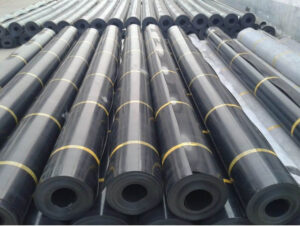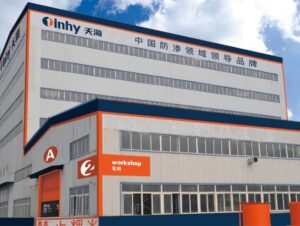The installation difference between HDPE geomembrane and PVC geomembrane
Material flexibility: PVC geomembranes are more flexible and malleable than HDPE geomembranes. This makes the PVC geomembrane easier to bend and fit to irregular surfaces and shapes during installation. HDPE geomembranes are relatively rigid and require more handling and welding operations to fit a particular structure when installed.
Welding method: During the installation of geomembrane, welding is a common connection method to ensure the continuity and sealing of geomembrane. HDPE geomembranes are usually joined using hot-melt welding technology, where the two pieces of membrane material are joined together by heat fusion at the welded joint. PVC geomembranes usually use solvent welding technology, using a suitable solvent to dissolve and join the membrane materials together.
Safety requirements: When installing geomembrane, whether it is HDPE or PVC, safety requirements need to be considered. For example, on construction sites, proper anti-slip measures are required to prevent workers from slipping or being injured.
Application environment: Depending on the specific application environment, the installation of HDPE and PVC geomembranes may be different. For example, in a high temperature environment, it is necessary to pay attention to the thermal deformation characteristics of the geomembrane, select the appropriate installation method and temperature control.
Construction difficulty: Due to the high flexibility and plasticity of PVC geomembrane, relatively speaking, its installation may be easier and faster. Due to the high strength and rigidity of HDPE geomembrane, more technical requirements and labor may be required during construction.
It should be noted that different engineering projects and specific requirements may also have different installation methods and steps. Before the actual installation, it is best to refer to the relevant installation guidelines and specifications to ensure that the geomembrane is installed correctly, firmly and meets the engineering requirements.

What are the advantages of hdpe geomembrane
HDPE geomembranes have many advantages that make them a choice for a wide range of applications in civil engineering and environmental engineering. Here are some key advantages of HDPE geomembranes:
Excellent physical properties: HDPE geomembrane has high strength and rigidity. It has excellent tensile strength, shear strength and puncture resistance to provide a reliable barrier, barrier and protection layer. This makes it widely used in fields such as foundation reinforcement, landfills, water conservancy projects and sewage treatment.
Good chemical barrier performance: HDPE geomembrane can effectively resist the erosion and penetration of chemical substances such as acid, alkali and salt. It has good resistance to solutions with different pH values, industrial wastewater and potential groundwater pollutants, ensuring the environmental friendliness and durability of the project.
Durability and environmental adaptability: HDPE geomembrane maintains stable performance in a wide temperature range and can adapt to different geographical environments and climatic conditions. It has good weather resistance and will not be damaged by environmental factors such as sun, rain and cold. In addition, HDPE geomembrane can also resist the erosion of microorganisms, microorganisms and roots, prolonging its service life.
Easy construction: HDPE geomembrane installation and construction are relatively easy, and the geomembrane can be spliced into the required size and shape by welding technology. Due to its good flexibility and machinability, it can adapt to irregular terrain and shapes, reducing construction difficulty and time.
Recyclable and environmentally friendly: HDPE geomembrane is a recyclable material that helps reduce waste generation and environmental pollution. It can be processed and utilized again after proper treatment, which is in line with the concept of sustainable development.
In a word, HDPE geomembrane has become an ideal choice widely used in underground engineering, water conservancy engineering, landfill and environmental protection engineering due to its excellent physical properties, chemical barrier ability, durability and environmental protection.

About Us
Established in 2002, Tinhy’s teams are focusing on manufacturings, marketing, installations, applications, and R&D of geosynthetics.
We now have 300+ experienced staff and operate 25+ advanced production lines and provided services to customers from 30+ countries.
Contact Us
[wpforms id=”40″]
Author

Founded in 2002, Tinhy's team focuses on the manufacturing, marketing, installation, application and research and development of geosynthetic materials.
View all posts





